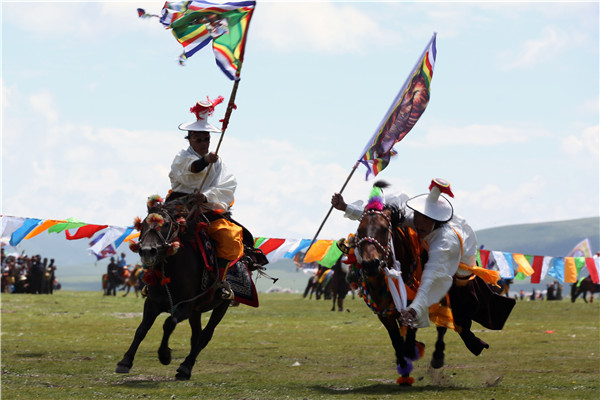 |
|
Tibetan riders display their skills and courage at this year's Jiatang Equestrian Culture Festival in Chindu county, Qinghai province. [Photo by Xu Haoyu and Luo Yunpeng/For China Daily] |
"Gentle horses cannot run wildly, and without speed, the equestrian performance will not be rakish enough," Ungog says.
"Horse racing is a great Tibetan culture, and it needs innovation to keep the balance between tradition and modern equestrian approaches. Of course, the younger generation relies on modern transportation tools more, but I'm glad to see more young people joining the equestrian association."
Palden is an association member who performed in the first annual equestrian festival last year. He participated this year, too.
He says traditional performances include shooting, brandishing a sword and picking up the hada (a long piece of white silk Tibetans present to honored guests) while riding a fiery horse; modern projects like presenting flowers and wine on the back of galloping horses are skills he picked up in the Inner Mongolia autonomous region and Xinjiang Uygur autonomous region.
When asked whether he likes motorcycles or horses more, Palden laughs and says: "Horses, because they are from the grasslands and will not hurt nature."
Pagyu Gyata, the director of publicity for Chindu county, says the festival aims to show the equestrian culture as the soul of the Jiatang grasslands, and it is about environmental protection as well.
"The festival shows the value of nomadic culture to visitors and also local residents." He says the festival reminds local people, from officials to herdsmen, to pay more attention to environmental protection to show their culture in a better condition to the world.
"After all, culture is the foundation of life," he says.
Xu Haoyu contributed to the story.